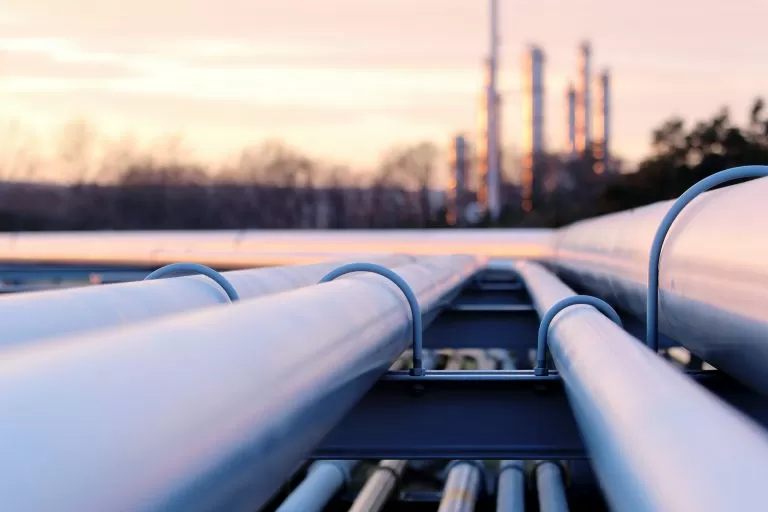Check out our White Paper Series!
A complete library of helpful advice and survival guides for every aspect of system monitoring and control.
1-800-693-0351
Have a specific question? Ask our team of expert engineers and get a specific answer!
Sign up for the next DPS Factory Training!

Whether you're new to our equipment or you've used it for years, DPS factory training is the best way to get more from your monitoring.
Reserve Your Seat Today
The oil and gas industry has a very large footprint. Across the three broad sectors - upstream, midstream, and downstream - that footprint includes many examples of remote sites hosting expensive, important assets.
Assets from wellheads to pipelines to holding tanks are often more than two hours away from the nearest maintenance worker. This causes delayed responses, which can allow problems to worsen.
Oil and gas SCADA systems help reduce this delay, saving money by improving maintenance results.
Supervisory Control and Data Acquisition (SCADA) systems gather and process data from geographically diverse areas and collect it for presentation at a central station or browser. At their core, they consist of numerous sensors placed on location, master stations to combine data from multiple sensors, and a central viewing platform.
This architecture allows oil and gas companies to monitor far-flung assets remotely, enabling smart, responsive maintenance decisions. And, SCADA equipment provides oil and gas companies with a vital tool for keeping their important assets online.
SCADA equipment monitors physical conditions in many sites remotely and continuously. While the sites - and assets - being monitored will vary based on the industry segment and particular operation, the SCADA equipment stays more or less the same.
Modern SCADA systems are made of various components including remote terminal units and master stations with a central browser.
Remote terminal units (RTUs) handle the "real-time data acquisition" portion of SCADA. These devices are robust and have attached durable sensors. Intended to operate for extended periods without aid, RTUs should be built to last.
The types of sensors attached to RTUs vary based on the needs of the equipment the RTU is monitoring. RTUs can:
With multiple components of the oil and gas company's infrastructure to monitor, maintenance personnel can rely on a network of RTUs that can be viewed on a central computer screen to easily manage remote equipment.
Master stations are SCADA software that receives information from multiple designated RTUs. And, master stations prioritize this information so that it can be viewed from a central browser.
This extra step greatly streamlines the flow of information from RTUs to company decision-makers.
Once the information passes along via the master station, dispatchers and company managers can make informed maintenance decisions in order of prioritization.
SCADA architecture has numerous applications in the oil and gas industry, and many sites have already begun implementing SCADA networks.
Upstream, midstream, and downstream oil and gas operations each stand to benefit from employing SCADA technology. While the specific applications will vary, the underlying value proposition remains the same:
SCADA solutions for oil and gas companies reduce equipment breakdowns and downtime, preventing costly accidents.
Upstream applications for SCADA include monitoring both the physical wellheads as well as the telecommunications networks used by field workers. RTUs can detect adverse conditions at remote well pads or at the communications towers that watch over them.
When a loss of pressure or extreme heat threatens the working order of a pump, managers at the field or regional office will be aware of it before the pump breaks. This allows them to dispatch maintenance before a breakdown, preventing costly downtime.
RTUs can be similarly useful in midstream applications, particularly in pipelining. RTUs can monitor flow rate, enabling managers to catch leaks or overpressure in real-time. This information can help pinpoint the problem before it worsens, growing into a serious spill or blowout.
Downstream at the refinery, RTUs can be used to monitor conditions across a sprawling, busy campus footprint. The size and complexity of these sites can require significant time to traverse. This means that early warning of the size and nature of issues at remote corners of the site can be essential to preventing catastrophe.
When an RTU provides information about the specific problem - like dangerously rising temperatures in a holding tank - maintenance workers and first responders can arrive on-scene prepared.
This saves time and can help save lives. As such, SCADA equipment provides value for oil and gas companies by reducing risk, preventing downtime, and informing management of activities.
Quality SCADA equipment will be durable and effective, able to keep working for years to come. Investing in SCADA equipment will give oil and gas managers the peace of mind of knowing that when something's going wrong, they'll hear about it in time to safeguard valuable assets.
DPS Telecom has the experience and expertise to help oil and gas operations monitor their most critical assets. Our experts can help you find the ideal solution for your monitoring needs. Reach out and get a quote today!
Image courtesy Shutterstock